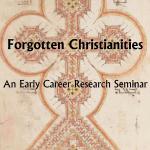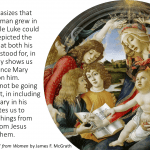With my interest in John the Baptist, I can’t believe that once again I had a clever money-making book idea too late to really seize the opportunity. Presumably everyone in North America is aware that cicadas will be emerging again after having lain dormant for 17 years. Readers of the Bible know that John the Baptist’s diet is supposed to have consisted of locusts and wild honey.
Booksellers know that a biblical diet book, and/or a book on how to do things for free, will sell well. A book that offers both would at least have the potential to be a bestseller and moneymaker.
If I had any sense and foresight, I would have seen the reappearance of the cicadas coming and would have worked on a recipe book that explained how to live on cicadas, how to cook them so they are tasty. It would have emphasized that this is a free food source and explained how to catch them. It would have emphasized that the recipes provided are possible ways that John the Baptist might have eaten locusts. It would have highlighted that this diet is biblical and will likely lead to weight loss.
If you have a phobia about bugs, this way of eating would definitely lead to weight loss.
I am not being entirely facetious. I had the idea (again too late) of writing two books immediately prior to the year 2,000. One would be written under a pseudonym and would explain why the world will end in 2000. The other written in my own name would debunk the first book. I could see this being a good way to earn a substantial amount, whether from one book or the other, and perhaps both.
There are many reasons why John the Baptist is a puzzling figure we have a hard time pinning down, and his diet is among them.
As I thought about my mostly joking idea for a book of recipes offering as many different ways as possible to prepare cicadas and honey for consumption (and yes, cicadas are indeed edible, in case you were wondering), my mind turned to that serious question about the significance of John the Baptist’s eating habits. Was the point that John only ate these items and nothing else as a matter of principle, even if offered hospitality? Was the focus on asceticism, or purity, or divine provision? Both those last two would make the point the lack of any humans beings other than John involved in growing, selling, preparing, or otherwise providing the food.
If there was symbolism in John the Baptist’s diet, what was it?
I am struck, as I think about this, by the possibility of a connection with the manna the Israelites ate in the wilderness. The most likely candidate for this “bread from heaven” is something still found in the Sinai desert today, an insect secretion that is loaded with sugar and not only edible but collected and eaten by the Bedouin.
Were people in John’s time aware of this as the source of the “manna”? Is it just a coincidence that the Israelites are said to have eaten an insect secretion that tastes like honey in the wilderness, and John ate insects and honey in the wilderness?
(This is of course assuming that there wasn’t a misunderstanding of a word early on or a copying error for “honey cakes.”)
Also on these topics (including evidence that will not surprise you showing that I wasn’t the first or only one to have this idea for a “biblical” food product):
The Secret Jewish History of Cicadas
FDA warns not to eat cicadas if you have seafood/shellfish allergies
Eating Locusts: the BBC reports that this kosher snack is taking Israel by swarm. Israeli company offers locust protein snacks in the United States. “Make way for John the Baptist’s favorite snack, locusts dipped in honey.” You can see the company’s website and their products here:
https://biblicalprotein.com/product/honey-and-apples-biblical-ingredients-energy-bar-3-bars-introduction-pack/
Also related:
https://www.innatthecrossroads.com/honey-spiced-locusts/
http://barelyadventist.com/loma-linda-recommends-locusts-and-honey-john-the-baptist-diet/
And on John the Baptist himself and his relation to Jesus:
Was Jesus a Follower of John the Baptist?–An Ancient Hebrew Matthew Offers New Evidence
The latest issue of the Journal for the Study of the Historical Jesus is focused on John the Baptist
Allan Bevere wrote about Daniel in the lion’s den and John the Baptist in the den of Herod













